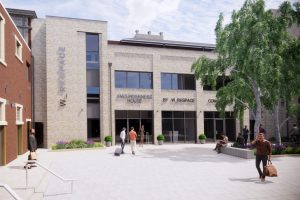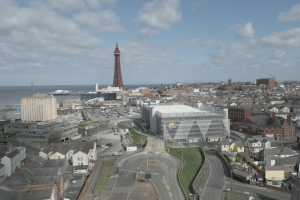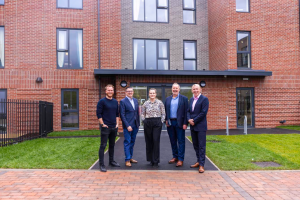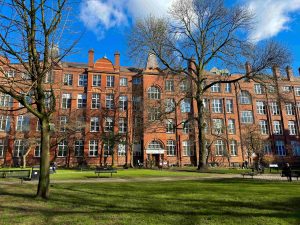Manchester is leading the way when it comes to urban living
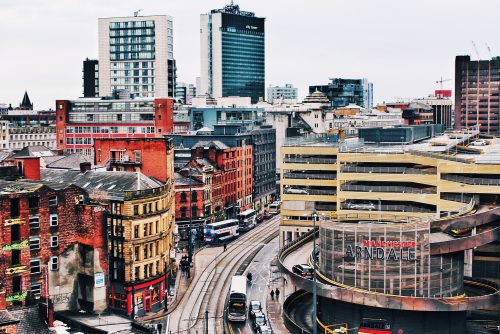
In the last 20 years there has been an influx of people moving into homes in Manchester city centre.
In the summer of 1996 when an IRA bomb ripped the heart out of central Manchester there were just a couple of hundred people living in flats and townhouses.
Now with more and more people turning their backs on the suburbs there are an estimated 40,000 people living in the area bordered by the inner city ring road.
And there is no sign of that trend slowing down any time soon with tower blocks and new districts springing up across central Manchester.
Manchester has one of the fastest growing city populations of any city in the UK.
People are opting out of the space and relative peace offerd by the suburbs for the convenience and hustle and bustle of city centre living.
TheBusinessDesk in partnership with law firm CMS held a panel discussion at the Manchester University Business School on the topic of Urban Living.
The panellists who took part were:
Clare Thomas, real estate partner at CMS
Dr Paul Jones, Capital and Centric
Michael Howard, owner and founder of Urbanbubble
Kate Howe, Muse Development
Tom Fenton, Far East Consortium
Michael Howard

Michael Howard
What has happened in Manchester, and I think it has happened in society as a whole, is that things have changed and they have changed quickly.
Whether that is because of the way we consume things or because of technology or because of the way we access information I don’t know. But Manchester for me is at the epicentre of the city centre residential boom. There is no doubt about that.
The demographic and the population of Manchester is heading back into the city. I think Manchester did a really good job of recognising the potential the city had and building a really solid long-term plan around that.
The universities, infrastructure, transport and business all work together to make the Manchester economy as strong as it is.
We are a growing economy, there is jobs growth. New businesses are arriving and the universities are getting stronger.
What has changed now is the quality on offer and Manchester is now developing some of the best residential developments in the UK.
We are now responding to what consumers want and we are providing communities and not just units.
Kate Howe
One of the things that we have seen in Manchester was that it was a leader in bringing forward a great residential offer.
We have found at Muse that one of the most important things about creating communities, is not just that it is about creating one type of asset class. If we want sustainable communities in our cities, it is about offering something for a range of people who want to come and live in our cities.
Build to rent is still really important for cities but we have to balance that with other models. There are still people living in cities who want to buy homes.
We need an even spread so that everyone is represented.
Community is not just what you do in one building, it is about what you do across the city and we have to be mindful of that.
Dr Paul Jones

Paul Jones
What has happened over the last two decades has led to a change in both perceptions and expectations.
If you went to the planning authorities in the late 1990s they would have argued that people did not want to live in the city. Those people who lived in the city centre two decades ago were very early adopters.
They recognised there was great potential. Over the two decades city centre living has become much more accepected and people now want to be part of that movement.
People were not fussy about the standard of housing they just wanted to live in the city. But people’s expectations have changed and the consumer has become a lot more discerning.
We try and focus on the community. It is not just about the bricks and mortar these days it is all about the community and the standard of life we are offering people.
That is why we sell to owner occupiers only.
Manchester is now becoming a great place to live and work in and most importantly to play in.
Tom Fenton

Tom Fenton
What we are seeing now is because there is competition for space people are building taller and more dense buildings.
If you look at last economic boom in 2008 we had one tall building in Manchester. If you look at the skyline now it is completely unrecognisable.
That is being partly driven by institutional funds, but that has now changed. The institutional funds are still there but the demand is there from renters.
This time around the boom is being very much driven by people wanting to come and live in the city centre and not just by the investors.
Clare Thomas

Clare Thomas
Real estate professionals are starting to think about taller buildings. We have moved away from the idea of the family living in a larger space. We are now looking at different concepts.
We are seeing schemes such as co living where the space you live in is relatively small but the amenities are fantastic.
There is a real shift towards new ways of living. We carried out a survey into this and we found that people are willing to give up space in return for great amenities.
We also talk a lot about generation rent. What is quite surprising is that this new way of living is not just for the Millennials. At all stages of our life people want experience and quality.
Whether it is student living or retirement living or any stage in between, people just want a great experience and a great lifestyle.




